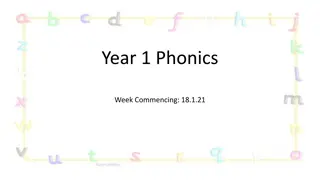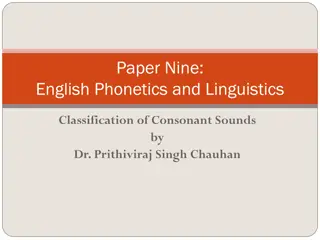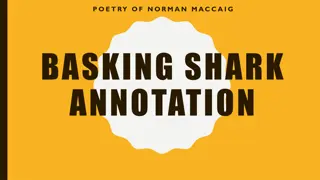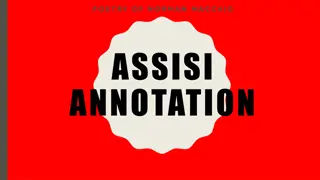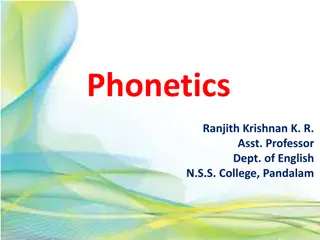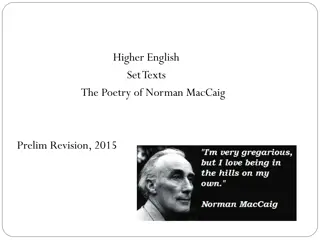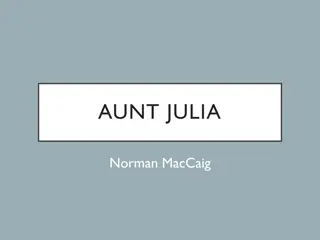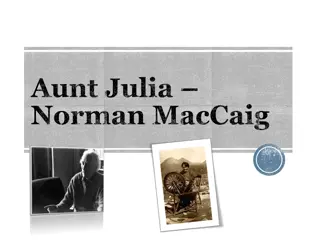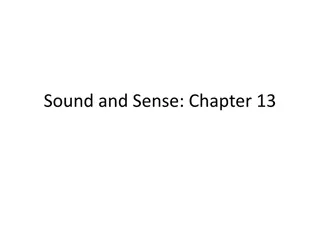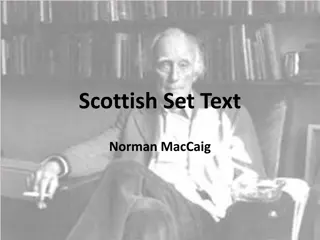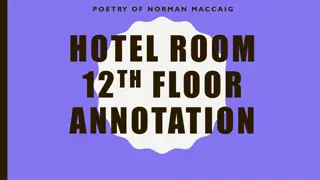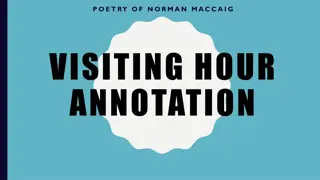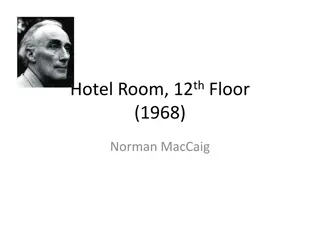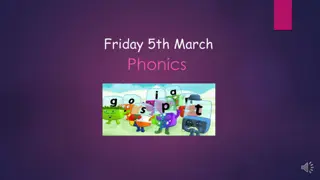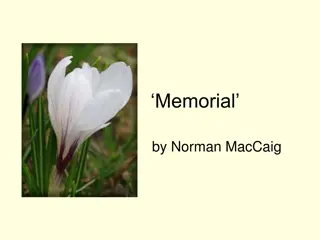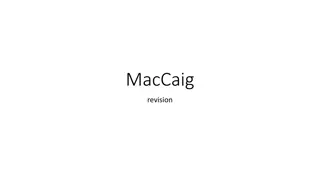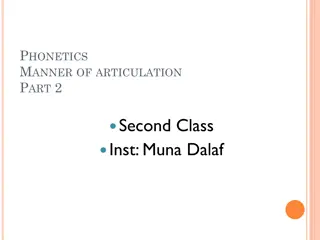Exploring Norman MacCaig's Poem "Sounds of the Day" in Kelso High School English Department
Delve into Norman MacCaig's poem "Sounds of the Day" through the lens of the Kelso High School English Department. Uncover the themes, poetic techniques, and structure of the poem as it guides readers through vivid natural sounds to a poignant reflection on parting. Understand the form, organization, and the emotional journey encapsulated within MacCaig's work.
Download Presentation

Please find below an Image/Link to download the presentation.
The content on the website is provided AS IS for your information and personal use only. It may not be sold, licensed, or shared on other websites without obtaining consent from the author. Download presentation by click this link. If you encounter any issues during the download, it is possible that the publisher has removed the file from their server.
E N D
Presentation Transcript
Kelso High School English Department
Sounds of the Day Norman MacCaig
Learning Intentions Familiarise ourselves with the poem. Develop our understanding of the form and structure of the poem. Develop our understanding of the poetic techniques used in the poem. Develop our understanding of the themes in the poem and the way in which they are conveyed through an effective use of poetic techniques.
Sounds of the Day When a clatter came, it was horses crossing the ford. When the air creaked, it was a lapwing seeing us off the premises of its private marsh. A snuffling puff ten yards from the boat was the tide blocking and unblocking a hole in a rock. When the black drums rolled, it was water falling sixty feet into itself.
When the door scraped shut, it was the end of all the sounds there are. You left me beside the quietest fire in the world. I thought I was hurt in my pride only, forgetting that, when you plunge your hand in freezing water, you feel a bangle of ice round your wrist before the whole hand goes numb. Norman MacCaig
Form and Structure This poem is written in free verse made up of four irregular stanzas. The division between each of the stanzas helps to focus the reader on the specific idea that is contained within each one The poem is organised in a fairly straightforward chronological order.
Form and Structure Stanza One In stanza one the speaker describes natural sounds: horses, a bird, waves and a waterfall. This stanza creates a pleasant picture and conveys the speaker s delight in nature.
Form and Structure StanzaTwo The shut door is the turning point of the poem. Here, the ideas move from a delight found in a variety of natural sounds to a reflection upon one specific experience a parting.
Form and Structure Stanza Three The speaker addresses the person who has left. We get the impression of a figure, suddenly alone, faced with the consequences of a separation.
Form and Structure Stanza Four Conveys how deeply the speaker has been affected by the experience. The relationship has meant a lot to the speaker and the separation, painful enough during the moment itself, has left a lasting impression.
Sounds of the Day -Stanza One Title seems straightforward as poem begins by listing the sounds of the day . Sound indicates life. When a clatter came, it was horses crossing the ford. When the air creaked, it was a lapwing seeing us off the premises Word Choice - the precision in the way these sounds are described convey MacCaig s observational skills of its private marsh. A snuffling puff ten yards from the boat was the tide blocking and unblocking a hole in a rock. When the black drums rolled, it was water The fact such delicate sounds can be heard suggests a still, practically silent environment. Here silence is something enriching which allows the speaker to hear and appreciate the natural world. falling sixty feet into itself.
Stanza One When a clatter came, Inverted list it is the sound that comes first rather than the subject or object that makes the sound. In this way, the speaker emphasises the sounds. It is therefore the sounds that are most memorable about this day. it was horses crossing the ford. When the air creaked, it was a lapwing seeing us off the premises of its private marsh. A snuffling puff ten yards from the boat was the tide blocking and unblocking a hole in a rock. When the black drums rolled, it was water falling sixty feet into itself.
Stanza One Poet uses a range of sound techniques to emphasise vitality and energy of nature. Onomatopoeia - clatter / creaked / snuffling puff . Onomatopoeia of clatter emphasises loud noise of horses hooves / Onomatopoeia of creaked conveys energy of location / variety of sounds surrounding narrator. Alliteration Clatter came - emphasises expected quality/ordinariness of the sound Repetition blocking / unblocking - echoes continuous everyday sounds Vowel sound of a echoes rattle of horses hooves on stones. O sounds in second line are mellow and non- threatening just like the horses. Sibilance of horses crossing in second line conveys soothing tone to emphasise his feelings of contentment. Nature is shown to be alive and full of sound in contrast to the next stanza. When a clatter came, it was horses crossing the ford. When the air creaked, it was a lapwing seeing us off the premises of its private marsh. A snuffling puff ten yards from the boat was the tide blocking and unblocking a hole in a rock. When the black drums rolled, it was water falling sixty feet into itself. Word Choice us suggests that speaker is not alone or isolated at this point in the poem
Stanza One When a clatter came, Humorous image personification. Bird becomes territorial like a landlord or gamekeeper ushering the speaker from its domain. it was horses crossing the ford. When the air creaked, it was a lapwing seeing us off the premises of its private marsh. A snuffling puff ten yards from the boat was the tide blocking and Air creaked very detailed description of the sound emphasises how still and quiet the poet must have been unblocking a hole in a rock. When the black drums rolled, it was water falling sixty feet into itself.
Stanza One Stanza finishes with the first hint that the poem may have a darker meaning than the first stanza suggests When a clatter came, it was horses crossing the ford. When the air creaked, it was a lapwing seeing us off the premises CK Sound consonance/harsh sounding words of its private marsh. A snuffling puff ten yards from the boat was the tide blocking and unblocking a hole in a rock. Metaphor- Black drums rolled creates a strong image of a storm coming. Roar of the sea illustrates the strength and power of nature. Connotation black represents grief and death. Drums rolling creates sense of impending doom and difficulty that lies ahead for the speaker. When the black drums rolled, it was water falling sixty feet into itself.
Stanza Two turning point in the poem Shutting door is a metaphor for the end of relationship and suggests a barrier that cannot be crossed. SENTENCE STRUCTURE - Object rather than sound comes first . Establishes CONTRAST between first stanza and lines that follow. Idea of the cessation of all that has gone before, Helps to emphasise that it was the end /of all the sounds there are . Word choice shut emphasises finality. ENJAMBMENT emphasises end and conveys the absolute nature of the change. When the door scraped shut, it was the end of all the sounds there are. Hyperbole / Word Choice of final statement underlines the significance of the moment. No pleasure in sitting listening to sounds . Due to the parting, nothing will ever be the same again. This intensifies the impact of the loss he is feeling. Change in tense at end of stanza makes clear impact on speaker as immediacy invites reader to share his distress Scraped Same harsh sound as at the end of stanza one Scraped has connotations of pain and hurt Clear sense of the despair and pain that follows a parting Idea that nothing will be the same again. Though a door can be reopened, speaker appears convinced there is no hope of a reunion. (links to Memorial) Single sentence stanza contrasts with previous one.
Stanza Three You left me Poem moves away from sounds to feelings and emotions beside the quietest fire in the world. This single sentence stanza explains the reason for this shift in mood between stanza one and the rest of the poem. The speaker implies the impact of the parting is that he is no longer to hear and take pleasure in sounds the huge impact of the loss.
Stanza Three Word choice quietest again emphasises the lack of sound. Again creates a contrast with stanza one and a contrast in feelings of speaker. You left me beside the quietest fire in the world. Use of personal pronouns / Second person makes clear who the speaker blames. Us of first stanza is no more. You emphasises blunt, accusing tone (similar technique used in Memorial) Unambiguous statement Sentence Structure single sentence adds impact to this statement. Imagery of silent fire. Fire should be seen as full of warmth, light but silence of fire suggests life without warmth, light or life about it. This symbolises how speaker now feels due to his loss/separation. He has lost the You of the first line. Enjambment emphasises me and conveys sense of isolation and abandonment felt by the poet. Hyperbole conveys extreme emotional pain of the parting. Being alone should exaggerate the sound, but fact that it appears to mute it, conveys that the impact of the parting is that he is no longer able to hear or take any pleasure in sounds so profound is his sense of loss.
Stanza Four I thought I was hurt in my pride only, forgetting that, when you plunge your hand in freezing water, you feel a bangle of ice round your wrist before the whole hand goes numb. The final verse is utterly bleak and totally contrasts with the pleasant imagery of first stanza The focus of the poem moves from sound to touch as he equates the effect of the parting to immersing a hand into freezing water Final stanza conveys the complexity of emotions that comes when there is a parting. There is the initial jarring pain of the experience and the subsequent feeling of numbness it is replaced with.
Stanza Four Repetition of I shows he is only concerned about himself. Word Choice pride only suggests his reaction was initially on a superficial level. Positioning forgetting that signals that he then realises emotional effects of loss will be on a much deeper level. I thought I was hurt in my pride only, forgetting that, when you plunge your hand in freezing water, you feel Word Choice plunge emphasises the impact of his loss will be much greater than he might have thought a bangle of ice round your wrist Metaphor - a bangle of ice . Just as hand thrust into cold ice will take moment to react, impact of loss will change from initial shock to closing down of all feeling. emphasises the raw and painful sense of loss of a breakup. Word Choice freezing creates bleak tone highlighting his pain before the whole hand goes numb. Positioning of you feel conveys how his positive emotions have been overtaken and shut down as a consequence of the parting.
Contrast Speaker s life / feelings before the loss contrasting with his feelings now. Idea of contrast connects with Aunt Julia noisy life force that is Julia contrasts with silence after her death / Visiting Hour professionalism of nurses contrasts with raw suffering of visitor / Assisi - external grotesqueness of dwarf contrasts with his inner beauty
Themes Loss / Separation Connects with Aunt Julia , Memorial , Visiting Hour .
Themes Loss / Separation Closing door IMAGE introduces the theme of loss and parting. The speaker feels his life has been changed and his senses altered forever.
Themes Loss / Separation Poem captures initial, difficult pain of a loss and also the lasting effect such experiences can have on us.
Success Criteria We are comfortable with the poem. We can explain the form and structure of the poem. We can identify and explain the effectiveness of the poetic techniques used in the poem. We can identify the themes in the poem and explain the way in which poetic techniques are used to convey these themes. We understand the way in which the themes of this poem link to other poems by MacCaig




